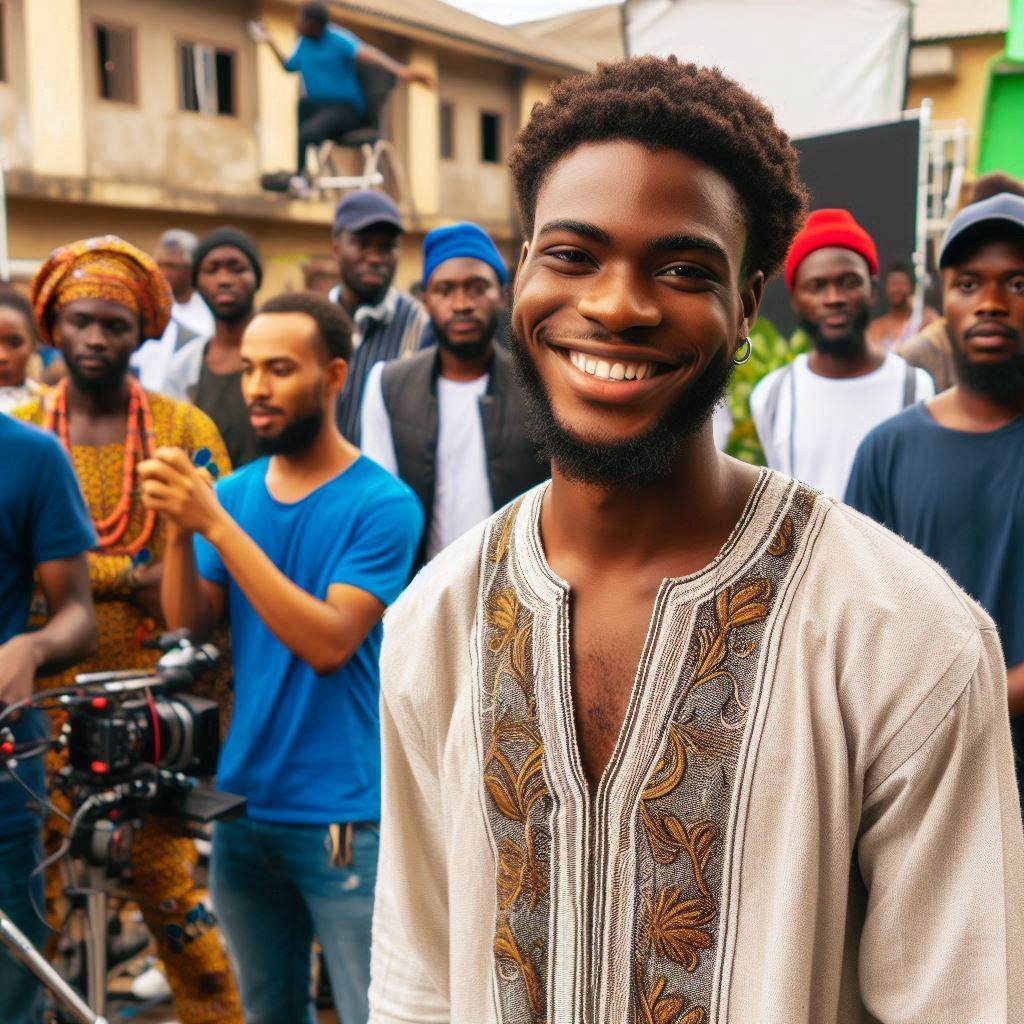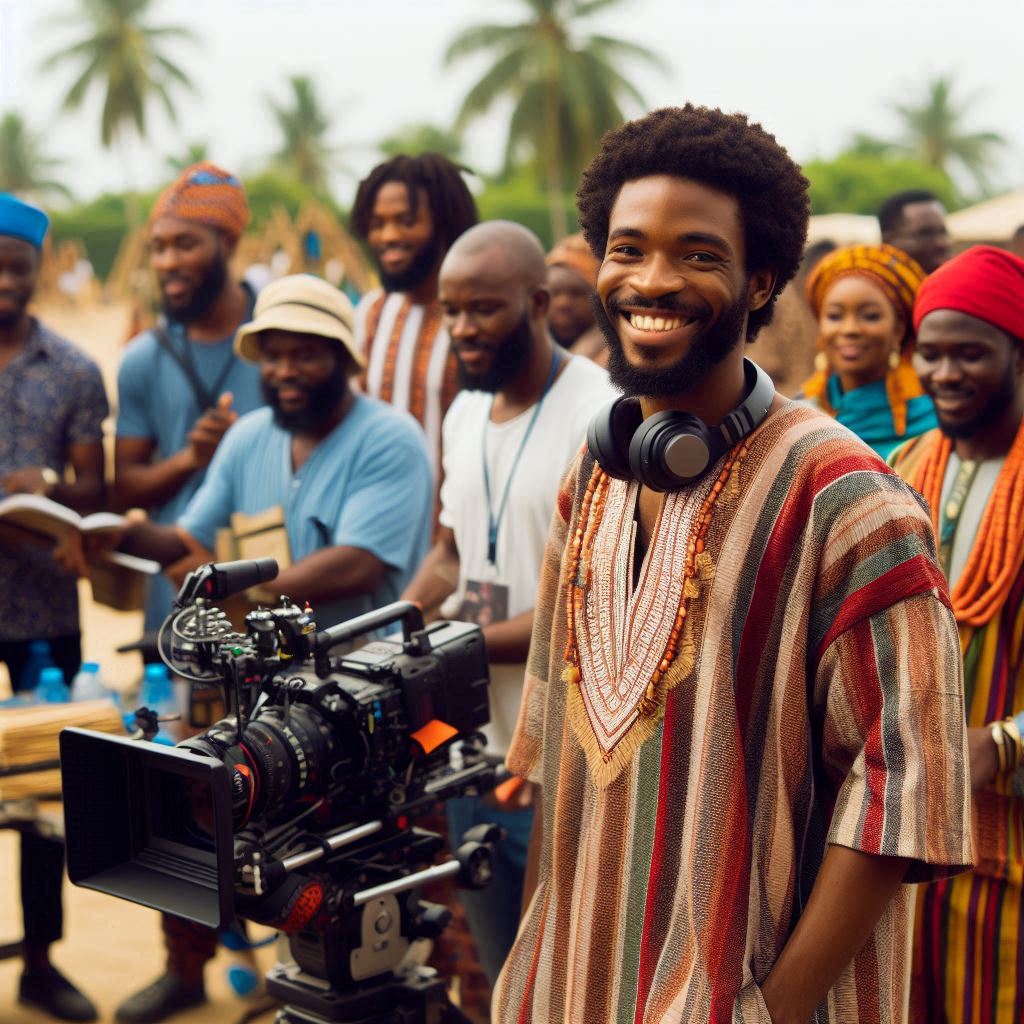Introduction
The Nigerian film and TV industry, popularly known as Nollywood, is a vibrant and growing sector. It ranks as one of the largest film industries globally, producing thousands of movies annually.
Nollywood has gained international recognition for its unique storytelling and vibrant cultural representation. To fully appreciate Nollywood, one must understand the various production roles within the industry.
Brief Overview of the Nigerian Film and TV Industry
Nollywood started in the early 1990s and quickly grew to become a significant cultural force. It produces a wide variety of content, including dramas, comedies, and thrillers.
These films often reflect the complexities and richness of Nigerian society. The industry employs many professionals, each playing a critical role in bringing stories to life.
Importance of Understanding Production Roles in the Industry
Understanding production roles is crucial for several reasons. Firstly, it ensures the smooth execution of film projects. Each role, from the director to the sound technician, contributes uniquely to the production process.
Secondly, it helps in recognizing the efforts of all individuals involved. This acknowledgment fosters respect and collaboration among crew members.
Lastly, it aids aspiring filmmakers in identifying their career paths. By knowing the various roles, they can better determine where their skills and interests align.
Key Production Roles in Nollywood
The Director
The director is the creative visionary behind a film. They interpret the script, guide actors, and oversee the artistic aspects of production. Directors make critical decisions about the visual and emotional tone of the film.
The Producer
Producers are the business minds of the production. They secure funding, manage the budget, and coordinate logistics. Producers ensure that the project stays on schedule and within budget.
The Scriptwriter
Scriptwriters create the blueprint for the film. They develop the story, characters, and dialogue. A well-written script is the foundation of any successful film or TV show.
The Cinematographer
Cinematographers, also known as directors of photography, are responsible for the visual look of the film. They work closely with the director to achieve the desired aesthetic through camera angles, lighting, and shot composition.
The Editor
Editors shape the final product by assembling raw footage into a coherent and engaging narrative. They work on pacing, continuity, and the overall flow of the film.
The Sound Technician
Sound technicians ensure that the audio quality of the film is top-notch. They handle everything from dialogue recording to sound effects and background music. Good sound design enhances the viewer’s experience.
In a nutshell, Understanding the various production roles in Nollywood is essential for appreciating the industry’s complexity and dynamism.
Each role is vital, contributing to the creation of engaging and culturally rich content. For those aspiring to enter the industry, knowledge of these roles is the first step towards a successful career in Nigerian film and television.
Overview of Film and TV Production Roles
When it comes to film and TV production in Nigeria, there are several key roles that are essential for the successful creation of a project. Each role plays a crucial part in bringing the vision of the project to life and ensuring that it is executed seamlessly.
Director
The director is the creative visionary behind the project, responsible for translating the script into a visual story. They work closely with the actors, crew, and producers to ensure that the film or TV show stays true to the intended vision.
Producer
The producer is in charge of overseeing the entire production process, from pre-production to post-production. They handle the logistical and financial aspects of the project and ensure that everything runs smoothly and stays within budget.
Cinematographer
The cinematographer, also known as the director of photography, is responsible for the visual elements of the project. They work closely with the director to establish the look and feel of the film or TV show through lighting, camera angles, and framing.
Editor
The editor is responsible for assembling the raw footage into a coherent and engaging final product. They work closely with the director to create a smooth narrative flow and ensure that the pacing and tone are consistent throughout the project.
Importance of Each Role in the Overall Production Process
Each of these production roles is crucial to the overall success of a film or TV project. Here’s why:
- The director brings the creative vision to life and ensures that the project stays true to its intended story.
- The producer keeps the production on track, manages the budget, and ensures that everything runs smoothly.
- The cinematographer establishes the visual style and tone of the project, enhancing the storytelling.
- The editor crafts the final product, ensuring that the story flows seamlessly and connects with the audience.
Without these key production roles, a film or TV show would not be able to come together cohesively and effectively communicate its intended message or story.
Each role is integral to the success of the project and plays a vital part in the collaborative nature of film and TV production in Nigeria.
Read: Communication Arts: Job Prospects and Salaries
Director
In Nigerian film and TV production, the director is the visionary leader, guiding every aspect of the project. They’re responsible for translating the script into visual storytelling, ensuring the narrative’s coherence and emotional impact.
A director’s role encompasses various tasks crucial for bringing a project to life.
Responsibilities of a Director
- Script Interpretation: The director analyzes the script to understand its themes, characters, and overall tone, aligning their vision with the writer’s intentions.
- Casting: Selecting the right actors is pivotal. The director holds auditions, negotiates contracts, and collaborates with casting directors to assemble the ideal cast.
- Storyboarding: Visualizing scenes through storyboards helps in planning shots, camera angles, and sequences, ensuring efficient filming.
- Directing Actors: Guiding actors in portraying characters authentically and eliciting the desired performances that resonate with the narrative.
- Collaborating with Crew: Effective communication with the production team ensures smooth coordination and execution of creative ideas.
- Shot Composition: Determining shot compositions, camera movements, and framing to enhance the storytelling and visual appeal.
- Decision Making: Making on-the-spot decisions regarding performances, blocking, and technical aspects to maintain the project’s momentum and quality.
- Post-production Supervision: Overseeing the editing process to ensure the final product aligns with the director’s vision and objectives.
Qualities and Skills Required
- Creative Vision: A director must have a clear and compelling vision for the project, envisioning how it will look and feel on screen.
- Leadership: Effective leadership skills are essential for guiding the cast and crew, fostering collaboration, and maintaining morale throughout the production.
- Communication: Strong communication skills are crucial for conveying ideas, providing feedback, and resolving conflicts effectively.
- Adaptability: Adapting to unforeseen challenges and changes in schedule or resources is vital in the dynamic environment of film and TV production.
- Problem-Solving Ability: Directors must be adept at solving problems creatively and resourcefully to overcome obstacles and keep the project on track.
- Technical Proficiency: Understanding the technical aspects of filmmaking, including camera operation, lighting, and sound, enhances a director’s ability to achieve their vision.
- Attention to Detail: Paying attention to nuances in performance, set design, and visual elements elevates the quality and authenticity of the final product.
- Collaborative Spirit: Collaboration with actors, crew members, and other stakeholders is essential for realizing the director’s vision and achieving a cohesive end result.
In Nigeria’s vibrant film industry, successful directors combine artistic vision, technical expertise, and effective leadership to bring captivating stories to life on screen.
Read: Impact of Communication Arts on Nigerian Media
The Essential Role of a Producer
In Nigerian film and TV production, the producer holds a pivotal position, responsible for orchestrating the financial and logistical aspects of a project. They are the driving force behind bringing creative visions to life on screen.
Financial Oversight
The producer’s primary duty is to manage the budget, ensuring that resources are allocated efficiently. They negotiate contracts, secure funding, and monitor expenditures to ensure the project stays within budgetary constraints.
Logistical Management
From scouting locations to hiring crew members, the producer oversees every logistical detail of the production. They coordinate schedules, arrange transportation, and procure necessary equipment to keep the project running smoothly.
Challenges Faced by Producers in Nigeria
- Limited Funding: Securing adequate funding for film and TV projects can be a significant challenge in Nigeria. Producers often have to navigate a landscape with limited financial resources, relying on a mix of investors, grants, and sponsorship deals.
- Infrastructure Constraints: Nigeria’s film industry, often referred to as Nollywood, faces infrastructure challenges, including inadequate studio facilities and outdated equipment. Producers must find innovative solutions to overcome these limitations and ensure production quality.
- Piracy: Piracy remains a pervasive issue in Nigeria, with illegal distribution channels undercutting the revenue potential of productions. Producers must implement anti-piracy measures and explore alternative distribution strategies to protect their intellectual property.
- Regulatory Hurdles: Navigating regulatory requirements and obtaining necessary permits can be time-consuming and bureaucratic. Producers must stay abreast of evolving regulations and work closely with government agencies to ensure compliance while minimizing delays.
Overcoming Challenges
- Diversifying Funding Sources: Producers in Nigeria often adopt a multi-pronged approach to funding, leveraging a combination of private investment, government grants, and international partnerships to finance their projects.
- Investing in Infrastructure: Forward-thinking producers invest in building and upgrading infrastructure, such as modern studios and production facilities, to enhance the quality and efficiency of their productions.
- Embracing Technology: Producers embrace digital technologies to combat piracy and expand distribution channels. Online streaming platforms offer new opportunities for reaching audiences while mitigating the impact of piracy.
- Advocating for Industry Support: Producers collaborate with industry stakeholders and government bodies to advocate for policies that support the growth of the Nigerian film and TV industry. By lobbying for incentives, tax breaks, and regulatory reforms, they create a more conducive environment for production.
In short, producers play a vital role in the Nigerian film and TV industry, navigating complex challenges to bring compelling stories to audiences worldwide.
Through strategic planning, creative problem-solving, and industry advocacy, they continue to drive innovation and growth in this dynamic sector.
Read: Internship Opportunities for Communication Arts Students

Cinematographer: Capturing the Essence of Visual Storytelling
In the dynamic world of film and TV production in Nigeria, the role of a cinematographer stands as a pillar of visual storytelling.
Importance of a Cinematographer
A cinematographer, often referred to as the director of photography (DP), plays a crucial role in translating the director’s vision into captivating visuals.
Their expertise lies in crafting the visual narrative, ensuring that each frame resonates with the intended emotion and message of the story.
In Nigeria’s vibrant film industry, cinematographers contribute significantly to the artistic and commercial success of productions.
Their keen eye for composition, lighting, and camera movement elevates the quality of Nigerian films and TV shows to international standards.
Techniques and Equipment
Cinematographers employ a variety of techniques to achieve stunning visual effects that captivate audiences and enhance storytelling.
One such technique is the use of different camera angles to create depth and perspective within scenes.
Whether it’s a wide establishing shot or a tight close-up, each angle serves a purpose in conveying the story’s nuances.
In addition to camera angles, lighting plays a pivotal role in cinematography, setting the mood and atmosphere of a scene.
Cinematographers in Nigeria masterfully utilize natural light, artificial lighting setups, and color grading techniques to evoke specific emotions.
Furthermore, the choice of camera equipment is crucial in achieving the desired visual aesthetic.
From high-end digital cameras to traditional film cameras, cinematographers select the most suitable tools for each project’s unique requirements.
In Nigeria, where budget constraints are common, resourcefulness is key, and cinematographers adeptly utilize available equipment to achieve remarkable results.
In essence, a cinematographer in Nigeria serves as the visual architect of a film or TV show, sculpting each frame with precision and creativity.
Transform Your Career with Expert Guidance
Get personalized mentorship consulting that’s tailored to your unique path. Our expert advice is actionable and exclusive.
Get StartedTheir contribution extends beyond technical proficiency; they are storytellers who paint with light and motion, bringing narratives to life on screen.
As the Nigerian film industry continues to evolve and gain global recognition, the role of cinematographers remains indispensable in shaping its cinematic landscape.
Through their mastery of techniques and equipment, cinematographers uphold the standards of excellence that define Nigerian cinema, inspiring audiences both at home and abroad.
In the tapestry of Nigerian filmmaking, the cinematographer’s brush strokes are vivid and enduring, weaving tales that resonate with audiences for generations to come.
Read: Language Arts Courses: What to Expect in Nigeria
Understanding the Role of an Editor in Nigerian Film and TV Production
Role of an Editor
An editor in Nigerian film and TV production plays a crucial role in post-production. They meticulously piece together raw footage to craft a cohesive final product. Their expertise lies in transforming disparate shots into a seamless narrative that captivates audiences.
Creating a Cohesive Final Product
The editor’s primary responsibility is to weave together various elements of the production into a unified whole. They carefully select the best shots, arrange them in chronological order, and trim unnecessary footage to maintain pacing and flow.
Through precise editing techniques, they enhance storytelling, evoke emotions, and maintain continuity.
Ensuring Technical Excellence
Apart from storytelling prowess, editors in Nigeria ensure technical excellence in the final product. They correct color inconsistencies, adjust audio levels, and apply visual effects to achieve the desired aesthetic.
Additionally, they synchronize audio with video, ensuring lip-sync accuracy and seamless transitions between scenes.
Software and Tools Utilized by Editors
Editors in Nigeria employ a range of software and tools to fulfill their creative vision. Adobe Premiere Pro stands as a popular choice due to its intuitive interface and robust editing capabilities.
It allows editors to work seamlessly with various video formats, apply effects, and collaborate efficiently.
Adobe After Effects
In addition to Premiere Pro, Adobe After Effects serves as a staple tool for Nigerian editors. It enables them to add visual effects, motion graphics, and animation to enhance the cinematic experience.
Editors leverage its versatility to create stunning title sequences, transitions, and special effects that elevate the production value of films and TV shows.
DaVinci Resolve
Another prominent software in the arsenal of Nigerian editors is DaVinci Resolve. Renowned for its advanced color grading capabilities,
Resolve empowers editors to manipulate color, contrast, and saturation to achieve the desired look and feel. Its integration with editing and audio tools makes it a comprehensive solution for post-production workflows.
In general, In Nigerian film and TV production, the role of an editor is indispensable. They serve as the architects of the final product, shaping raw footage into compelling narratives.
Through their mastery of editing software and tools, they elevate storytelling and ensure technical excellence, contributing to the growth and success of the industry.
Challenges in the Nigerian Film and TV Industry
Overview of Challenges
In Nigeria’s vibrant film and TV industry, professionals face multifaceted challenges. These hurdles range from funding constraints to infrastructural deficiencies.
Securing adequate funding remains a perpetual hurdle. Limited budgets often constrain creativity and inhibit the realization of artistic visions.
Inadequate infrastructure, including outdated equipment and facilities, hampers efficiency and quality. This deficiency impedes seamless production processes.
The industry grapples with an unstable regulatory environment, marked by inconsistent policies and enforcement. This uncertainty stifles innovation and investment.
Piracy and Copyright Infringement
Piracy and copyright infringement pose significant threats. Unauthorized distribution of content erodes revenues, discouraging investment and endangering livelihoods.
The allure of better opportunities abroad leads to a talent drain. Skilled professionals seek greener pastures, depleting the local industry’s expertise pool.
These challenges profoundly impact production roles and overall quality. Limited resources and talent drain hinder the realization of creative visions.
Reduced Production Values
Insufficient funding and outdated infrastructure result in reduced production values. This compromises the visual and technical aspects of productions.
Piracy and regulatory challenges restrict access to formal distribution channels. This limitation impedes reaching wider audiences and maximizing revenues.
The need to navigate funding constraints and regulatory hurdles stifles creative freedom. Creativity takes a back seat to financial viability and compliance.
Despite these challenges, industry professionals exhibit resilience and ingenuity. Collaborations and innovative approaches emerge as strategies to overcome hurdles.
In fact, The Nigerian film and TV industry faces a myriad of challenges, from funding constraints to talent drain. These hurdles impact production roles and the overall quality of productions.
However, amidst these challenges, there’s room for optimism. By fostering collaborations and embracing innovation, the industry can navigate these obstacles and continue to thrive.
Conclusion
Importance of Understanding Film and TV Production Roles in Nigeria
In Nigeria’s burgeoning film and TV industry, understanding production roles is paramount. Each role contributes uniquely to the creation of captivating visual narratives.
From directors to cinematographers, sound engineers to costume designers, every role intertwines creativity and technical expertise. Understanding these roles fosters collaboration and ensures a harmonious production process.
Efficiency is the heartbeat of successful productions. By comprehending each role’s significance, filmmakers can streamline workflows, optimize resources, and deliver high-quality content to audiences.
Nigeria’s diverse culture is a wellspring of storytelling inspiration. Through understanding production roles, filmmakers can authentically portray Nigerian narratives, enriching global perspectives and preserving cultural heritage.
Knowledge is power. By delving into production roles, aspiring filmmakers empower themselves with the skills and insights needed to excel in the industry. Each role presents unique opportunities for growth and contribution.
Aspiring filmmakers and industry professionals, the time to act is now. Educate yourselves on the intricacies of film and TV production roles. Embrace learning opportunities through workshops, courses, and mentorship programs.
Every project, no matter how small, offers a chance to learn and grow. Seize opportunities to shadow experienced professionals, volunteer on sets, and immerse yourself in the dynamic world of production.
The Nigerian film and TV industry thrives on collaboration and innovation. Engage with fellow filmmakers, share knowledge, and explore new ways to push creative boundaries. Together, we can elevate Nigerian cinema to greater heights.
Contribute to Industry Growth
Contribute your talents and expertise to the growth of the industry. Whether behind the camera or in the editing suite, your unique perspective and skills are invaluable to shaping the future of Nigerian filmmaking.
The journey to becoming a proficient filmmaker is challenging but immensely rewarding. Embrace the process, learn from setbacks, and celebrate victories along the way. Your dedication will fuel the evolution of Nigeria’s vibrant film and TV landscape.
In closing, Understanding film and TV production roles in Nigeria is not just about mastering technical skills; it’s about embracing creativity, fostering collaboration, and contributing to cultural representation.
Aspiring filmmakers, seize the opportunity to educate yourselves and play your part in shaping the future of Nigerian cinema. Together, let’s embark on this transformative journey and propel the industry to new heights.




